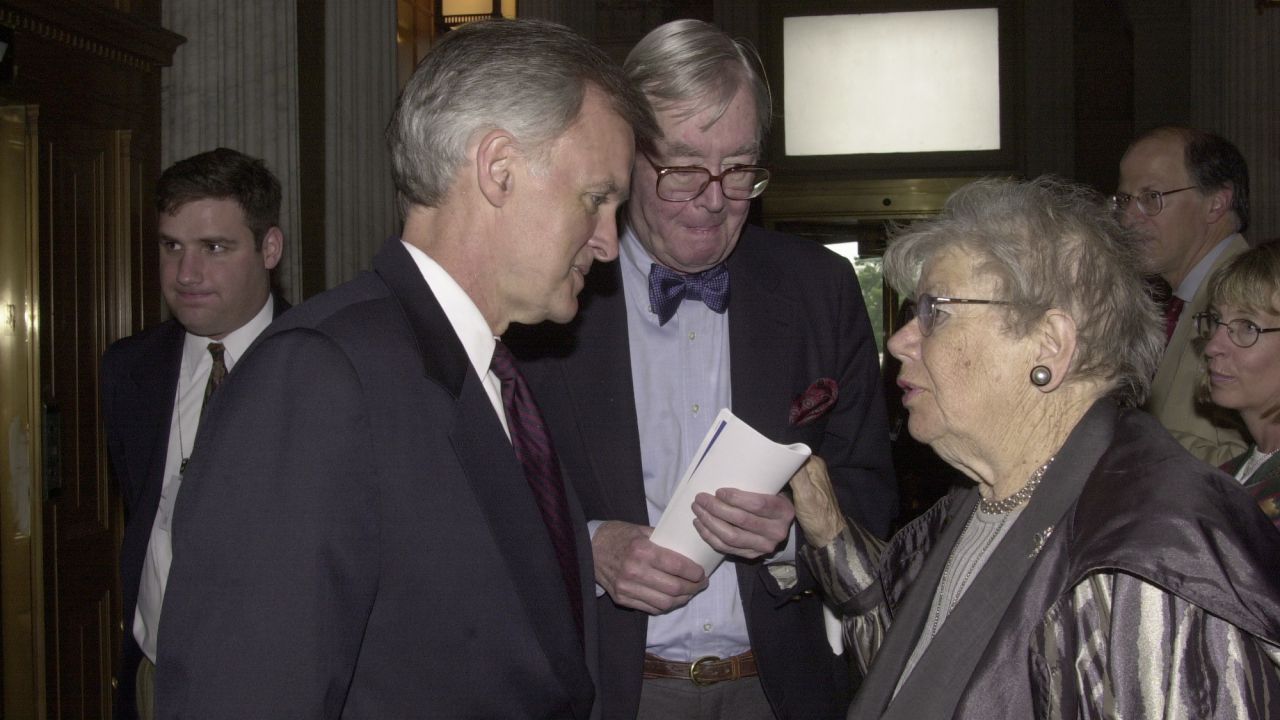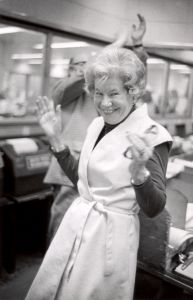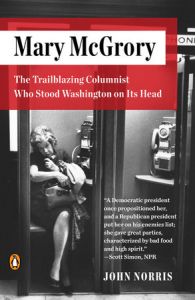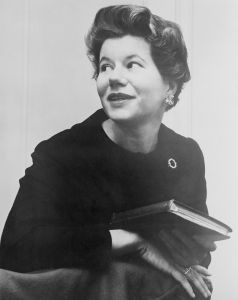
Columnist Mary McGrory never stopped working her beat. In this undated photo, she's interviewing Sens. Bob Kerrey, (D-NE), and Daniel Patrick Moynihan (D-NY) in the US Capitol. (Photo By Douglas Graham/Roll Call/Getty Images)
There’s no shortage of trenchant and witty takes on Donald Trump stuffing his golden feet in his mouth as Hillary Clinton trudges toward her likely victory. But if Mary McGrory were still here, I bet she would reign above the din. Born shortly before women gained the right to vote, she became one of the nation’s most widely syndicated columnists.
Devoted to shoe-leather reporting and painstaking rewrites, she deftly tackled topics ranging from nuclear weapons and papal succession to Jane Austen and gardening. Above all, she’s best remembered for peerlessly capturing the essence of political animals over half a century of opinion writing.
“There are a number of exceptional journalists writing today,” writes her longtime friend and colleague Mark Shields in an email, “but Mary’s combination of passion for the forgotten, the despised and all children is unmatched.” So was her ability to skewer the powerful.
Ronald Reagan believed in “making life more comfortable for the comfortable,” she observed in 1980. “For Richard Nixon, it was exit snarling” she wrote when the Republican lost the California governor’s race in 1962. McGrory’s unabashed liberalism didn’t spare Democrats from her barbs. “Nobody knows what (Mario) Cuomo is waiting for as he issues daily bulletins from somewhere deep inside his psyche,” she noted in 1991 as the New York governor mulled a presidential run he ended up not making. “People don’t know (Al) Gore and don’t trust (Bill) Clinton,” she said of the ticket headlined by a man she described as a “lusty, scrape-prone lad.”
Wincing at her pen’s sting became a bipartisan White House tradition. “Mary McGrory is the best writer in Washington, and she keeps getting better and better at my expense,” Democrat Lyndon B. Johnson complained. “How can I get through to Mary McGrory?” Republican George H.W. Bush whined to Ben Bradlee. In Mary McGrory: The First Queen of Journalism, writer John Norris says that the Washington Post’s executive editor told Bush “not much could be done.” News of this exchange pleased the writer, who said: “So they do read me. That is all I want.”
I feel lucky to have read Norris’s biography, published last year, during the Republican and Democratic conventions. It makes today’s circus easier to bear and imbues it with déjà vu. McGrory called the 2000 race between Gore and George W. Bush “a battle between the unlikable and the unprepared.”
Norris chronicles the columnist’s career and personal life. Reared in a working-class Boston family, she got her start in journalism as a book reviewer. She first worked for a paper in her hometown and then at The Washington Star, which eventually let her cover politics in her own style. At The Star, from which she regretfully decamped only when it folded, and then at The Washington Post, McGrory fought to have her columns placed on the news pages rather than in the op-ed section. It was never clear where they belonged because she pioneered the now common art of relaying the day’s news with a distinctive and unapologetically opinionated voice.
Somehow she still found the time to vacation regularly in Italy and New Hampshire and throw big parties in her apartment on Macomb Street in Northwest Washington. Norris recounts how she put prominent guests to work tending bar and rewarded them with bad food. “Never, ever eat her Jello Surprise,” New York Times columnist Maureen Dowd once warned a crowd of McGrory’s admirers.
Would McGrory have leaned into Hillary Clinton’s candidacy? It’s hard to say. Nuisances like being barred from National Press Club membership or a “stag” meeting with Nixon at The Star’s grubby office made her job harder. Scotty Reston, the powerhouse Washington bureau chief and columnist for The New York Times, “tried to bring McGrory aboard his talented team, but the negotiations collapsed after Reston suggested that in addition to her reporting duties, she would need to handle the switchboard in the morning.” Like many powerful women of her generation, she never married or had children. Later in life, she expressed some remorse about that choice but she was always “a reluctant warrior on the front lines of feminism,” Norris writes. Rather than crusade against sexism, she exploited it. McGrory conscripted her mostly male traveling companions into “bearers” who hauled her luggage on the road.
McGrory, a staunchly Catholic pro-life Democrat avoided the subject of abortion but also criticized the church’s opposition to birth control and once quoted an Italian woman who said “to be a Catholic doesn’t mean to be an imbecile,” she wrote. Shields thinks she “almost certainly” she would have taken a shine to Clinton’s running mate, the Jesuit-educated Tim Kaine, but her fellow Catholic’s equally complicated views on reproductive rights aren’t the reason why.
What McGrory would have most liked about Kaine, Shields writes, are his relentless efforts to make Congress more accountable for sending US servicemen and women into battle and his “refreshing lack of self-importance.”
“She liked the writings of St.Thomas a Kempis, who counseled — and Mary practiced — ‘Fawn not upon the great,’” Shields adds. “Sadly, St. Thomas’ advice, as reflected by the guest list at DJT’s most recent wedding, has not been the practice of this year’s presidential nominees.” (The reference is to the Clintons’ by-now well-chronicled attendance at Trump’s third nuptials.)
What McGrory likely would have appreciated about Clinton is the would-be commander-in-chief’s emphasis, underscored at this year’s Democratic convention, on the importance of protecting and nurturing the country’s future as embodied in its children.
McGrory expressed her Catholic faith by volunteering at St. Ann’s, a center for at-risk children and families just outside Washington, not only reading to the children but unabashedly leveraging her influence on their behalf. The kids got to meet the president when they visited the White House during the John F. Kennedy and Bill Clinton administrations. When he was attorney general, Bobby Kennedy had government vans shuttle the otherwise disadvantaged kids to his Hickory Hill mansion to swim in his pool. Political and media titans were pressed into service for annual Christmas parties with the likes of Tim Russert in a Santa suit. The nuns who ran St. Ann’s became some of McGrory’s closest friends and confidantes, along with colleagues she bonded with at The Star and members of her extended family.

Mary McGrory celebrating her Pulitzer Prize in the newsroom. (Photo by The Washington Post/Getty Images)
All told, McGrory donated at least a fifth of her income to charities she supported with time, money and connections, Norris figures. When Nixon put her on his enemies list and she endured a grueling politically motivated audit, she got a tax refund for having under-reported her deductible contributions. She would certainly have found Trump’s cheapskate philanthropy appalling.
McGrory’s intimacy with elite politicians would be unfathomable today. Having gone on a date with John F. Kennedy when he was still single, she parlayed her acquaintance with him into a close relationship with the entire Kennedy clan. She mined her access to insiders for insight, not titillating scoops and when LBJ invited himself to her apartment to proposition her, Norris recounts, she rebuffed the married president without writing a word about it. But her consorting with sources sometimes went too far. Norris believes she probably had an affair with Democrat Eugene McCarthy on the campaign trail in 1968. And it’s certainly true that she also played more of an operational than observational role in his bid.
Any news junkie would enjoy poring over this book or Norris’s abbreviated version on Politico’s website. To read McGrory’s writing, check out the posthumous anthology her colleague and former “bearer” Phil Gailey edited. With some patience and a lot of clicking you can find some columns from her years with The Post. McGrory, who would be turning 98 this month, won the Pulitzer Prize for commentary in 1975. She wrote more than 8,000 columns between 1954 and 2003, when she suffered a stroke at the office. She died a year later.
We can only imagine what she would have done with Trump’s candidacy. But she did write about his family in 1990. “The defense budget is the closest we come to the sums being talked of in the divorce settlement between Ivana and Donald,” McGrory said of the Republican nominee’s first divorce. “Watching the Trumps, Washington thinks of itself as wholesome.”
(Contributing: Michael Winship)






